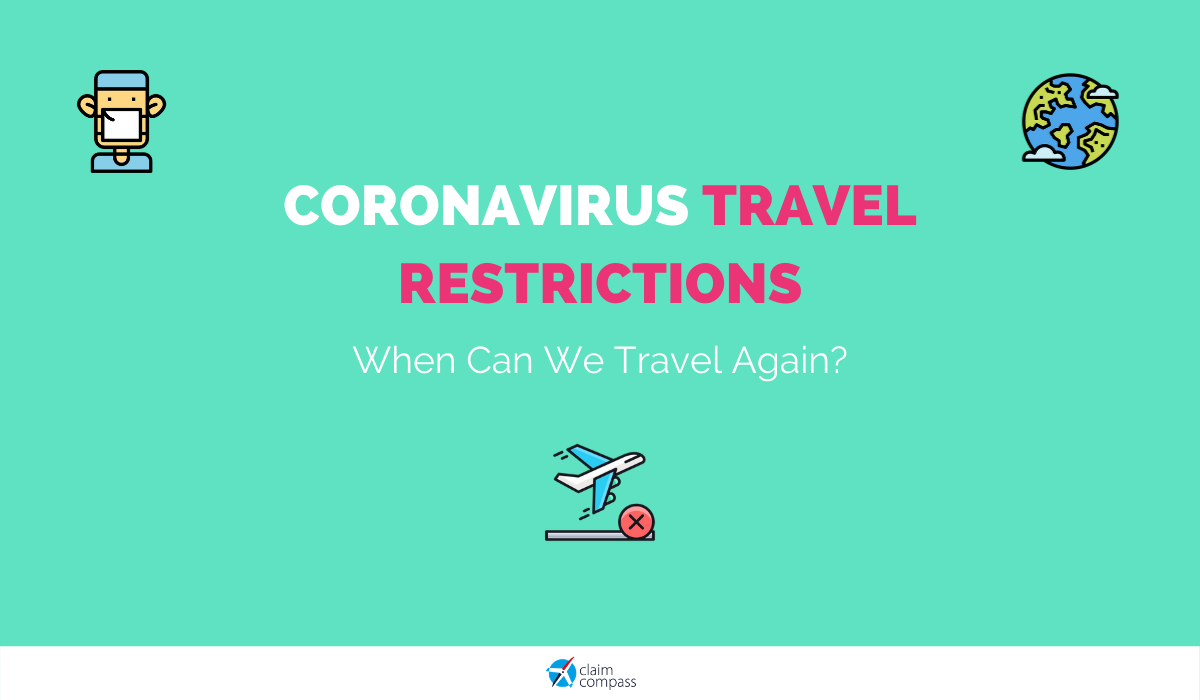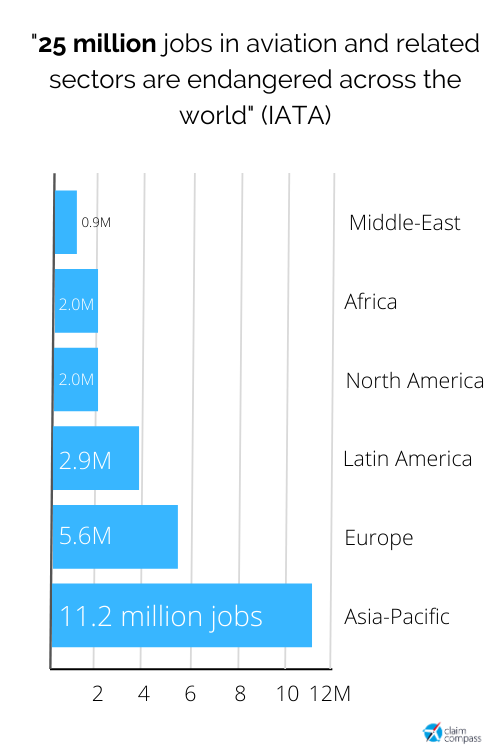Coronavirus Travel Restrictions: When Can We Travel Again?
Amid coronavirus travel restrictions, you might wonder when travel will resume. This post details the most likely scenarios on when you'll travel again.

Amid the coronavirus outbreak, nations across the world have set up travel restrictions and bans, in the hope that this will help safeguard their population’s health and limit the propagation of COVID-19.
The tourism industry has been massively hit, air carriers perhaps more so than any other businesses. According to industry researcher Cirium, over 16,000 passenger jets are grounded worldwide. This is the lowest amount of airplanes in service in the past 26 years.
With these extraordinary circumstances putting an unprecedented strain on their finances, airlines have turned to governments for support.
While some air passengers managed to secure a flight cancellation refund from the airline, others are still claiming for it. Indeed, many have had their travel plans reduced to mere memories with the cancellation of their flight due to coronavirus.
Whether you had travel plans or not, if you’re like most people, you now stay home dreaming of escaping the lockdown and taking a vacation. While many governments have announced that the confinement and quarantine measures would be lifted at some point in May, will you be able to travel then?
About 91% of the world population (7.1 billion) live in countries that imposed travel restrictions because of coronavirus.
What are the current travel restrictions and when will we be able to travel again?
Here are some answers to those complicated questions, at a time when uncertainty reigns and the only constant in political announcements is change.
Travel Restrictions around the World
Most countries have implemented entry bans for travelers, along with quarantines for their citizens. Travel restrictions vary in form but have generally the same goal: prevent their citizens from travelling abroad and deny entry to travelers potentially contaminated.
What are the travel restrictions for the USA?
Since COVID-19 was declared a public health emergency on January 31, 2020, the United States have taken measures, first by imposing a quarantine to travelers who had been to the province of Hubei, China in the past fortnight.
The United States then denied entry to foreign nationals who travelled to Iran during the previous 14 days, while American citizens were only allowed to come back via approved airports.
Mid-March, Donald Trump announced (unilaterally) that he suspended incoming travelers from the Schengen area, in Europe, after the pandemic massively spread to Western Europe, hitting the north of Italy the hardest. The UK and Ireland were also included in the ban on the next day, on March 14. Initially, those travel restrictions to Europe were set up for a duration of 30 days, but they haven’t been lifted, as “this proclamation shall remain in effect until terminated by the President."
On March 19, the State Department recommended all US citizens not to travel internationally, issuing a Level 4 “do not travel” advisory, the highest that the federal agency can issue.
The border with Mexico was closed to all nonessential travel on March 21. This came after Canada and the USA decided to close their border by mutual decision (again, for nonessential travel only).
What are the travel restrictions in Europe?
Each country took individual measures at the national scale, but the Europe Union closed 26 countries to the rest of the world on March 16 and enforced quarantines and social distancing measures. EU citizens, permanent residents, as well as medical professionals such as health care workers and scientists were exempt from the travel ban but most EU countries requested a 14-day isolation period once within the borders of the European Union.
Germany closed its borders with neighbors Austria, Denmark, France, Luxembourg and Switzerland on March 16. Nonessential travel has been banned.
France closed its borders on March 17 restricted travel to other countries within the Schengen Area.
Italy, the hardest-hit country in Europe, was placed on lockdown even earlier as an attempt to limit the propagation of COVID-19. People entering the country must submit themselves to self-quarantine for a period of 14 days. Temperature screenings have also been set up at the country’s major airports.
Most Scandinavian countries such as Norway and Denmark have closed their borders to foreign nationals without a residency permit.
The same applies to Spain, where only residents and citizens can enter the country.
Turkey closed its borders with its neighbors, including Iran, and on March 27, President Recep Tayyip Erdogan suspended all foreign flights.
In the UK, the government is merely advising against “all but essential travel to some countries, cities and regions”.
How do travel restrictions affect tourism?
A lot. According to the International Air Transport Association (IATA), revenue from air passengers could drop by nearly a third of a trillion dollars in 2020 and that 25 million jobs in the aviation and related industries were at risk globally. Asia would be the most affected area, with over 11 million jobs potentially compromised.

According to the US Travel Association, it’s close to 5 million travel-related jobs that may be lost due to COVID-19. Travel agents and tour operators are experiencing historical drops in revenue. Large and small businesses alike are hit hard.
Hotels also face massive drops in occupancy as well as revenue amid the pandemic outbreak. In the face of uncertainty regarding when people will be able to travel again, the sector might be even more dramatically hit if travel bans extend beyond the summer, peak season compared to the rest of the year that makes up for the low and shoulder seasons.
That’s for the current situation. Now, when will travel restrictions be lifted?
Travel Again… When?
More than a month has passed since most measures have been taken by governments throughout the world. Most first extended the travel restrictions, but it seems that we are now reaching a turning point, with several countries carefully relieving their lockdown restrictions. A third of Americans want to travel shortly after the pandemic is contained. Will they be able to, and should they?
When can we travel again after Coronavirus?
Being one of the most severely affected, the travel industry cannot wait for bans to be lifted. It’s safe to assume that air travel won’t recover as fast as the train and bus, since domestic travel should resume before international travel.
When will international travel resume?
Many people booked tickets for their summer holidays and are holding their breath, wondering whether the coronavirus crisis will mess with their plans. It’s hard to admit, but some experts have mentioned the possibility of a return to air travel no earlier than at the end of the year, even potentially next year.
According to Roger Dow, chief executive of the U.S. Travel Association, “Americans generally are going to stay home until next year. Europe is done for American travelers.”
Travel guide publisher Rick Steeves says he’ll be “grateful for anything we can salvage out of 2020.”
The same applies to cruise ships, as the Centers for Disease Control and Prevention (CDC) extended their no-sail ban without mention of a date hinting at the return of sailing.
Airlines dread missing the peak season of July and August, but predictions are pessimistic. Low-cost airlines in particular try to get people to book flights for the summer, with Ryanair expecting to resume flights as early as June and easyJet slashing hold luggage fees.
If your travel plans are affected by the coronavirus pandemic, know that your airline should allow you to postpone your trip by removing their change fees, even if you didn’t buy travel insurance. You can also request a refund for your flight if it turns out to be cancelled.
When will domestic travel resume?
Lockdown measures are being loosen at the national scale in many countries throughout Europe, which leads to the high probability that domestic travel could resume faster.
Analysts already talk of 2020 as the “year of the car” in travel. Indeed, without planes in the air, travelers have started to consider alternative plans that often include short getaways and road trips closer to home rather than overseas trips. Clayton Reid, Chief Executive of ravel industry analyst MMGY Global, predicts that Americans would probably get back to travelling by car rather than any other means.
The question is: even if we could travel again as early as this summer… should we?
When will it be safe to travel again?
Several countries have already reported a decline in new COVID-19 cases and announced the soon reopening of schools and public spaces such as parks.
Among them, Italy, Spain, Germany, Austria, Denmark, Norway, Poland, Czech Republic, Luxembourg and Iceland. Those countries are lifting their harshest restrictions to boost economies.
But getting back to normal, even progressively, might still be too early. We incur the risk of seeing the number of cases rise massively and a return to a prolonged lockdown situation.
According to European Commission head Ursula Von Der Leyen, a return to full normality cannot occur until a vaccine has been developed.
On traveling, she said:
“I'd advise everyone to wait before making holiday plans.”
At this stage, it is still too early to make reliable forecasts for the summer.
Conclusion
The World Health Organization (WHO) recommended against the implementation of travel restrictions and bans after the beginning of the outbreak, after which not only are they “not effective in preventing the importation of cases but may have a significant economic and social impact”.
However, it also advocated for the implementation of better measures regarding the prevention and detection of coronavirus cases. And those are far from existent.
While travel bans may be lifted progressively starting from the middle of May, it is certain that this doesn’t mean a return to normal is to be anticipated before the end of the year at least. Domestic travel will recover first, most likely by the road rather than the air, while international travel will continue to be massively restricted.
We advice travellers to put their summer travel plans on hold, as frustrating as it may be.
Stay safe!
Did you know that you could get up to 600€ in compensation for your canceled or delayed flight?
Get money back from the airline for your disrupted flight:
Note that flights canceled because of the coronavirus pandemic are NOT eligible - but you can claim for flights up to 5 years ago!
